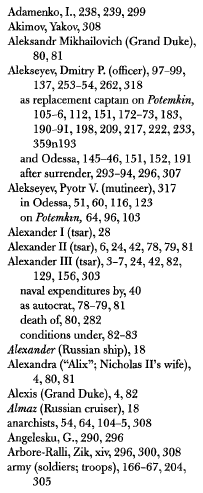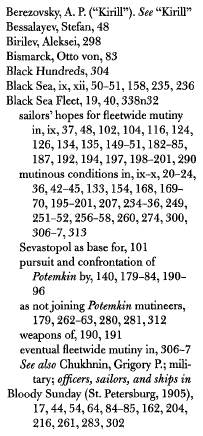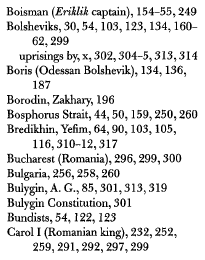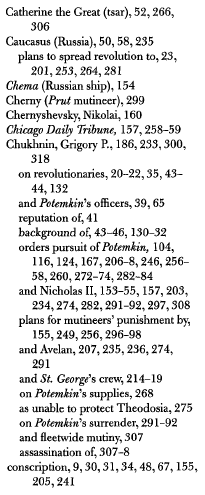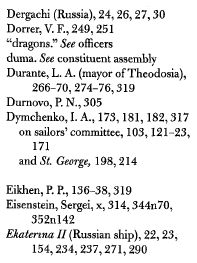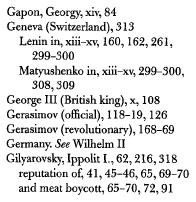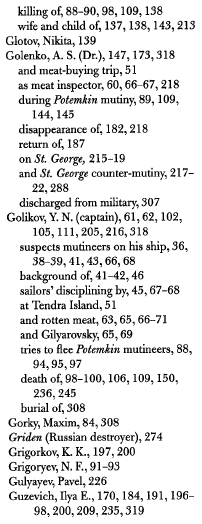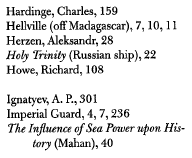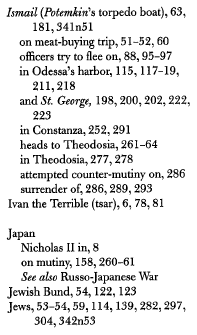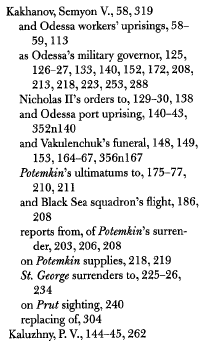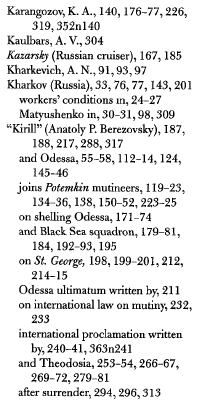Red Mutiny (59 page)
Authors: Neal Bascomb

[>]
Â
At 3
P.M.,
a barge:
ibid., pp. 184â85; Matyushenko, p. 311.
"
Have you heard anything":
Berezovsky, pp. 250, 254.
[>]
 "
Don't let them":
ibid., pp. 251â55.
[>]
 "
We're now fighting": Revolyutsionnyi bronenosets,
p. 49.
When they returned:
Ponomarev, p. 137; Popov; Matyushenko, p. 311.
Across the Black Sea:
TsGAVMF, f. 870, op. 1, d. 149, pp. 161â65; Bliznyuk; Platonov, pp. 118â19.
[>]
Â
But down in the engine room:
Bliznyuk.
In Sevastopol, Chukhnin:
TsGAVMF, f. 920, op. 6, d. 428, p. 150; Gavrilov,
V borbe za svobodu,
p. 131.
[>]
 "
Resolve this situation":
TsGIA(M), f. 601, op. 1, d. 105, p. 40.
"Potemkin
demands coal":
Gavrilov,
V borbe za svobodu,
p. 131.
Throughout the day:
TsGAVMF, f. 920, op. 6, d. 428, p. 127.
A full moon hung:
Berezovsky, p. 260; Feldmann, p. 186.
[>]
Â
Throughout the battleship:
Nevsky, p. 269; Matyushenko, p. 311.
In the city:
Popov; TsGAVMF, f. 920, op. 6, d. 428, p. 118.
CHAPTER 22
[>]
Â
As the sailors awakened:
Popov; Matyushenko, pp. 311â12; Feldmann, pp. 187â96; Berezovsky, pp. 216â67; Kovalenko, pp. 66â67, Nevsky, pp. 268â69; Ponomarev, pp. 138â39.
[>]
 "
Let's go ashore":
Berezovsky, p. 264.
To prepare, some sailors:
Gavrilov,
V borbe za svobodu,
p. 136.
"
There's no support":
Kovalenko, p. 66.
Matyushenko listened:
Matyushenko, pp. 312â13; Selivanov,
Matros Matyushenko,
pp. 25â26; Berezovsky, p. 264; Hough,
Potemkin Mutiny,
p. 179.
They steered a course:
Gavrilov,
V borbe za svobodu,
pp. 136â37.
[>]
Â
It was a warm evening:
Romanov, N., June 23, 1905.
The humiliating
Potemkin
mutiny:
ibid.;
Chicago Daily Tribune,
July 6, 1905.
"
The sons of Russia": Novoye Vremya,
June 22, 1905.
The reactionary newspaper: Moskovskiye Vedomosti,
June 23, 1905.
[>]
 "
Fear is the sole basis": Russkoye Slovo,
June 23, 1905;
Chicago Daily Tribune
July 6, 1905.
"
It was sufficient": Nasha Zhizn,
as quoted in
Russkoye Slovo,
June 23, 1905.
What the censors: Times
(London), July 6, 1905;
Daily Telegraph,
July 8, 1905.
As Nicholas neared:
Romanov, N., June 24, 1905.
[>]
 "
We can't tell you": New York Times,
July 7, 1905.
Late that night:
TsGAVMF, f. 870, op. 1, d. 149, pp. 164â68; Bliznyuk; Melnikov, pp. 119â20.
The
Stremitelny
thrust onward:
Hough,
Potemkin Mutiny,
pp. 183â85; Bliznyuk; Platonov, p. 120; TsGAVMF, f. 870, op. 1, d. 149, p. 167.
CHAPTER 23
[>]
Â
The
Potemkin
steamed:
Berezovsky, p. 268.
"
Can't sleep, Marion?":
Ponomarev, pp. 140â41.
[>]
Â
He was right:
Lychev, pp. 81â82.
"
Everyone wondered":
ibid., p. 81.
[>]
Â
This dilemma, coming:
Berezovsky, pp. 271â72.
Kirill could scarcely bear:
ibid., pp. 268â75.
"
It was tragic":
Matyushenko, p. 313.
[>]
 "
You pitiful cowards":
ibid.
By dusk, the placid sea:
Lychev, p. 82.
At 11
P.M.
the ships:
Berezovsky, pp. 275â76.
Shortly after midnight:
Bogachev, p. 24.
[>]
 "
soul of the mutiny":
Selivanov,
Matros Matyushenko,
p. 262.
"
What do you want":
Bogachev, p. 24; Nevsky, p. 272; Berezovsky, p. 276; Matyushenko, p. 313.
When Negru arrived:
Nevsky, pp. 272, 283; Lychev, p. 83.
[>]
 "
I have the honor":
Hough,
Potemkin Mutiny,
p. 207.
General Lagovari knew:
ibid., pp. 207â10.
He immediately dispatched:
Platonov, p. 166.
Pisarevsky would likely arrive:
TsGAVMF, f. 417, op. 1, d. 3023, p. 207.
The previous night:
ibid., p. 237; Nevsky, p. 365.
[>]
Â
On June 25, the sun rose:
Lychev, p. 82.
"
Comrades, you all know":
Ponomarev, p. 143.
Before Matyushenko left:
Matyushenko, p. 314; Platonov, p. 121.
[>]
Â
Once Negru learned:
Ponomarev, p. 143; Matyushenko, p. 314.
"
This is where":
Lychev, p. 82.
The sailors gathered:
TsGAVMF, f. 417, op. 1, d. 3023, p. 273; Matyushenko, p. 314; Nevsky, p. 273.
As one sailor:
ibid.
"
There was no joking":
Lychev, p. 84.
Ensign Alekseyev and the petty officers:
ibid.; Platonov, p. 170.
[>]
Â
Kovalenko wore civilian clothes:
Kovalenko, pp. 67â68.
Kirill was so overwhelmed:
Berezovsky, p. 278.
Matyushenko bid farewell:
Matyushenko, p. 314; Feldmann, p. 133.
Stepping onto the quay:
Gavrilov,
V borbe za svobodu,
p. 139; Nevsky, pp. 272â73.
The sailors gathered:
Nevsky, p. 273.
"
Dear comrades":
Kardashev,
Burevestniki revolyutsii,
p. 52.
[>]
Â
Over in the harbor:
Hough,
Potemkin Mutiny,
p. 183; TsGAVMF, f. 417, op. 1, d. 3023, pp. 270â79;
Chicago Daily Tribune,
July 11, 1905.
EPILOGUE
[>]
 "
The revolutionary":
Bakunin, as quoted in Radzinsky, p. 13.
Before midnight, Matyushenko:
Nevsky, pp. 276â77; Lychev, p. 95.
In Constanza:
TsGVIA, f. 400, op. 5, d. 21, p. Ill; Platonov, p. 170; Nevsky, pp. 273â77; Lychev, pp. 89â90.
Immediately on learning:
TsGAVMF, f. 920, op. 6, d. 428, p. 171.
[>]
Â
Relieved that the nightmare:
Romanov, N., June 25, 1905.
When Rear Admiral Pisarevsky:
Bogachev, p. 25.
Over the next several hours:
ibid.; Hough,
Potemkin Mutiny,
pp. 209â15.
"
the revolutionary demons":
Gavrilov,
V borbe za svobodu,
p. 154.
Lieutenant Yanovich then:
Platonov, pp. 168â70.
A letter published: Russkoye Slovo,
June 25, 1905.
"
shows that the sea":
Gavrilov,
V borbe za svobodu,
p. 174.
Its liberal cousin:
ibid.
"
There were no true":
ibid.
[>]
 "
the broadest of broad": Daily Telegraph,
July 10, 1905.
"
acute stage":
Alzona, p. 53.
Several German newspapers:
Stern, pp. 464â71.
"
the moral for Russia": New York Times,
July 11, 1905.
Besides, he was:
Romanov, N., June 26, 1905.
To stave off:
Platonov, p. 155.
"
weak, indecisive, lazy":
ibid., p. 172; Zebroski, p. 441.
Although several naval officers:
TsGAVMF, f. 417, op. 2, d. 852, p. 247.
[>]
Â
Begun on July 20:
Platonov, pp. 125â26; Gavrilov,
V borbe za svobodu,
pp. 155â57; TsGAVMF, f. 407, op. 1, d. 166, pp. 46â48; Kardashev, "Novyye Svedeniya."
In the same month:
TsGAVMF, f. 1025, op. 2, d. 27, pp. 261â71; Gavrilov,
V borbe za svobodu,
p. 157.
When Matyushenko heard:
Lychev, pp. 98; Krupskaya, pp. 117â18; Chernenko and Shlyakhov.
"
Understand that the whole":
ibid.
[>]
Â
In the months:
Shlyakhov.
"
There will be a mutiny":
TsGIA(M), f. 102, op. 00, d. 1667, pp. 15â16; Shlyakhov.
"
Change will come soon":
Nevsky, pp. 336â38.
Four days after:
Harcave,
Memoirs,
pp. 422â23; Thompson and Hart, p. 61; Dillon, p. 298.
"
a sewer needed":
Esthus, p. 63.
[>]
Simultaneous with these efforts:
Ascher, pp. 177â89; Harcave,
First Blood,
pp. 162â65; Figes, pp. 186â87.
[>]
Â
In September, Nicholas:
Salisbury, pp. 150â51.
Twenty-four hours later:
ibid., pp. 151â55; Harcave,
First Blood,
pp. 176â91; Howe, pp. 231â41; Lincoln,
In War's Dark Shadow,
pp. 297â99.
[>]
Â
For the most part:
Ascher, p. 237.
"
living in an utter":
Figes, p. 191.
"
sweeping away a thousand":
ibid.
[>]
Â
Witte outlined these points:
Mossolov, pp. 89â90; Essad-Bey, pp. 164â70; Salisbury, pp. 154â57.
"
My dearest Mama":
Bind, pp. 183â86.
While the tsar whined:
Essad-Bey, pp. 170â71; Healy, pp. 16â17.
Then true mayhem erupted:
Harcave,
First Blood,
pp. 199â205.
[>]
Â
In the streets:
Healy, pp. 15â17; Figes, pp. 196â97; Klier, pp. 224â25; Ascher, p. 258.
The greatest tragedy:
Weinberg, pp. 166â69.
Hand in hand:
Lincoln,
In War's Dark Shadow,
pp. 306â9; Ascher, pp. 275â303.
"
Victory, that for us:
Figes, p. 199.
[>]
Â
After announcing a general strike:
Ascher, pp. 304â25.
"
exterminate the gangs":
Ascher, p. 321.
"
it is impossible":
Figes, p. 201.
Over the next five months:
Ascher, pp. 341â42.
On April 27, 1906:
Essad-Bey, pp. 174â77; Healy, pp. 148â52; Tyrkova-Williams, pp. 55â57; Vassili, pp. 343â45; Nevinson, pp. 320â26; Howe, pp. 285â87.
[>]
Â
A day after the signing:
Shlyakhov; Harcave,
First Blood,
pp. 203, 221â22; Trotsky,
1905,
pp. 198â207.
[>]
 "
nest of sailor revolutionaries":
TsGIA(M), f. 102, op. 00, d. 1667, p. 5.
On January 26, 1906:
TsGAVMF, f. 1025, op. 2, d. 19, p. 31.
The proceedings lasted:
Gavrilov,
V borbe za svobodu,
p. 158; TsGAVMF, f. 1025, op. 2, d. 35, p. 34.
As for Konstantin Feldmann:
Feldmann, pp. 273â93.
He would never see:
Plotto; Gavrilov,
V borbe za svobodu,
p. 160; TsGAVMF, f. 417, op. 1, d. 3457, pp. 21, 94.
[>]
 "
God, have mercy":
Chernov, p. 351; TsGAVMF, f. 417, op. 5, d. 361, pp. 13â31.
Matyushenko knew exactly:
Chernenko and Shlyakhov; Selivanov; Guttridge, p. 141.
[>]
Â
Since the mutiny's end:
Chernenko and Shlyakhov; TsGAOR, f. 102, op. 8, d. 1221, pp. 173â77, 205, 251, 313.
On June 6, his photograph:
TsGAOR, f. 102, op. 8, d. 1221, p. 205.
Still Matyushenko slipped:
Nevsky, pp. 327â29; Chernenko and Shlyakhov; TsGIA(M), f. 102, op. 00, d. 1667, p. 9.
[>]
"
Two dozen guards":
Chernenko and Shlyakhov.
He was forbidden:
Platonov, pp. 131â36; Adoratsky, pp. 250â53; Zebroski, pp. 484â85; Nevsky, pp. 31â32; Chernenko and Shlyakhov. The events and description of Matyushenko's execution are primarily based on the observances of Bredikhin, who later conveyed them in a letter to Arbore-Ralli. This letter, and other details of his last days, are found in these five sources.
[>]
Â
Seventy-two days:
Lieven, p. 60.
A lack of coordination:
Figes, pp. 202â04.
What caused the
Potemkin: Bogachev, pp. 14â15; Rostotskaya, p. 32; Lychev, p. 86; Berezovsky, pp. 8â9, 279; Feldmann, p. 199;
Proletary,
July 4, 1905; Platonov, p. 41;
Revolyutsionnaya Rossiya,
July 1, 1905;
Revolyutsionny bronenosets.
[>]
Â
Of the entire
Potemkin: Zebroski, p. 466.
Most remained in exile:
ibid., pp. 185â93.
The battleship
Potemkin: Gavrilov,
V borbe za svobodu,
p. 194.
"
Each time the Black Sea Fleet":
ibid., p. 193.
